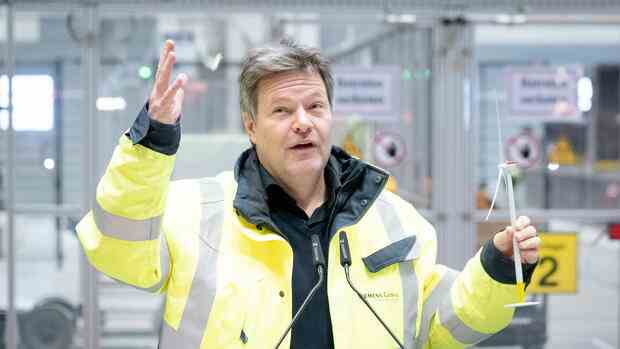The Federal Minister of Economics campaigned for German industry in Brussels – in vain.
(Photo: IMAGO/Chris Emil Janssen)
Berlin, Brussels In its efforts to give industry easier access to subsidized price controls for electricity and gas, the federal government has failed on a number of key points. The EU Commission has rejected the corresponding change requests.
The EU Commission presented its new rules for state aid on Thursday. Accordingly, the upper limits for the aid will not be raised, and the EU Commission has also rejected the request for an extension of the funding beyond the turn of the year 2023/24 until the end of April 2024.
Even more serious for many companies is that the EU Commission is also sticking to the controversial Ebitda regulation. According to this, a company that wants to take advantage of the full subsidy must record a decrease in earnings before taxes, depreciation and amortization (Ebitda) by more than 40 percent in the period from February 1, 2022 to the end of December 2023 and already guarantee this decrease when submitting the application.
In a twelve-page statement dated February 13, the federal government addressed the EU Commission in order to influence the design of future state aid regulations. On the first page of the letter, the “central demands” of the federal government are listed. These include the extension of the funding period, an increase in the upper limit for aid and the deletion of the criterion of reduced profits.
The federal government followed the demands of the industry. Industrial companies had massively criticized the design of the electricity and gas price brake last autumn.
At the instigation of industry, Habeck turned to Brussels
Federal Economics Minister Robert Habeck (Greens) then assured that he would support the EU Commission for the interests of industry. At the same time, however, he had pointed out that the Brussels authorities were not very flexible in discussions with representatives of the federal government.
That has now come true. In the industry, the disappointment is great. “The now revised EU subsidy requirements do not help us with the application of the price brakes,” said Jörg Rothermel, energy expert at the German Chemical Industry Association (VCI). As a result, “the full use of the price brakes will continue to be unattractive for many companies”.
According to information from the industry, 100 companies in Germany are affected by the fact that aid is limited to a maximum of EUR 150 million.
The Commission’s intransigence reflects a shift in sentiment. Energy price brakes are viewed increasingly critically in Brussels. The EU Commission sees two problems in particular: On the one hand, the subsidies are a burden on national budgets and make debt reduction more difficult. On the other hand, they distort competition within the EU because financially stronger countries like Germany can help their companies more.
EU Commission appeals to reduce energy aid
When presenting the budget policy recommendations for 2024 this week, Commission Vice President Valdis Dombrovskis appealed to governments to scale back their energy aid. “The time for broad support is over,” he said. As energy prices fall, governments should phase out their support measures.
Added to this is the concern that competition will be distorted. Therefore, the liberal Competition Commissioner Margrethe Vestager emphasized on Thursday that the state aid rules will only be relaxed “specifically, temporarily and proportionately”.
On another point, the federal government is not even trying to persuade Brussels to change its mind. This is evidenced by the answer of State Secretary for Economic Affairs Patrick Graichen to a question from Union MPs Maria-Lena Weiss. The CDU politician wanted to know what changes the federal government was planning on the energy price brakes with regard to the different relief amounts for affiliated and non-affiliated companies.
Graichen replied that his house was not striving for “any changes on this point”. Affiliated companies are when legally independent companies are economically connected. These can be companies in a group of companies.
Companies do not leave a good hair when it comes to the design of the price brakes
The different treatment of affiliated and non-affiliated companies is reflected as follows, according to calculations by the hot-dip galvanizing industry association: An affiliated company with ten locations receives a maximum total relief of two to four million euros, a relief of 200,000 to 400,000 euros per location, a non-affiliated company maximum two to four million euros for one location.
From the point of view of the industry, this is an incomprehensible unequal treatment. “Locations of a group must be viewed as individual locations,” said Kai Seppeler, board member of the hot-dip galvanizing industry association.
The association points out that the vast majority of member companies consider improvements to the energy price brakes to be urgently needed. He refers to a survey among all member companies.
80 percent of the member companies criticize the high level of bureaucracy involved in submitting an application, 100 percent of those surveyed consider the threshold values to be too low or set incorrectly, 75 percent state that, despite the brakes, they have additional costs for electricity and gas, which amount to more than amount to 50 percent.
More: The new European mega-project – A hydrogen network infrastructure is to be created in the North Sea
